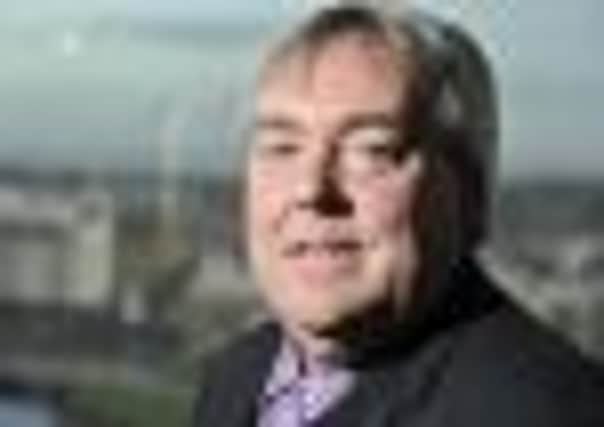Interview: Malcolm Roughead, chief executive of VisitScotland


HE CAME to VisitScotland in 2001 as head of marketing, by which time Malcolm Roughead had already seen first hand many remarkable milestones, ranging from bizarre record-breaking feats to the fall of the Berlin Wall.
Now as chief executive of Scotland’s national tourism board, Roughead is working towards what he believes could be a similarly momentous shift for the hospitality industry. With a string of high-profile events set to boost visitor numbers during the next three years, Roughead speaks of “changing the face of tourism” across the country.
Advertisement
Hide AdAdvertisement
Hide Ad“We are in a really good place,” he says, referring to the line-up that includes this year’s Olympic Games, the Diamond Jubilee, Natural Scotland celebrations in 2013 and a blockbuster schedule of Commonwealth Games, the Ryder Cup and Homecoming Scotland events in 2014.
“If we are aware of the opportunities, if we know what we want to do and plan for that, then we won’t look back and say that we missed our chances. It is really about harnessing the diversity that we have, and looking at how we make that palatable and easy for people to access.”
Though he stresses variety, the theme for this year’s seventh annual Scottish Tourism Week has the distinctively sporting overtone of “Competing for Growth”. Activities begin tomorrow with a conference at Edinburgh’s Murrayfield Stadium, followed in the evening by a reception for MSPs at the Scottish Parliament.
These and further events are aimed at highlighting the importance of tourism, which contributes £11 billion annually and employs more than 220,000 people across the Scottish economy. Roughead, who took over as VisitScotland chief executive after the abrupt departure of Philip Riddle in 2010, says the organisation has made enormous strides during the past decade. Though his previous work took him around much of the world, where he witnessed a number of historic events, Roughead ranks his time in tourism among his career highlights.
“It has probably been, of all the things I have done, one of the most fascinating and challenging of tasks,” he says.
Born in Perth and raised in Stenhousemuir, Roughead studied modern languages at Glasgow University before joining Nestlé as a marketing trainee in London in 1981. He then moved on to pharmaceutical group Beecham, before joining Guinness, which eventually got wrapped into Diageo, in 1983.
He worked as regional manager for West Africa during his early years with Guinness, a post that took him to countries including Togo, Ghana, Gambia, Cameroon and the Cote d’Ivoire from his base in London.
A year later, he was given additional responsibility for the Middle East and southern Europe, and by 1985 he was based on the outskirts of Dusseldorf in Germany. Roughead was in an Irish pub in Berlin’s Europa Centre four years later when the Brandenberg Gate was opened, an event that he describes simply as a “truly memorable night”.
Advertisement
Hide AdAdvertisement
Hide AdHe was transferred not long thereafter to South Africa, where Guinness was setting up a joint venture with South African Breweries. He arrived in the wake of Nelson Mandela’s release from prison, and was still in the country during the general election of 1994 that marked the end of apartheid.
By 1997, it was time to move on again: “I thought they might send me to Hong Kong, because we were giving it back to the Chinese,” jokes Roughead, “but I went back to London instead.”
There he was put in charge of marketing at Guinness Publishing, home of the eponymous book of world records.
Despite the iconic status of The Guinness Book of Records, Roughead says it was at that time “a very old-fashioned kind of publisher” with declining revenues and profits. The endless procession of lists was overhauled with the addition of photos and graphics, while Roughead concentrated on striking commercial deals that led to the rise of programmes such as Guinness World Records Smashed in countries around the globe.
He also staged events for record-breaking attempts across the vast array of achievements registered in each annual. This inadvertently brought him back to Germany on the tenth anniversary of the fall of the Berlin Wall, when the city hosted an attempt by Fairy to clean more dishes than any other washing-up liquid.
By 2001, he had heard of an opening to head up marketing at the newly-renamed VisitScotland, and was drawn to the challenge of the post.
“It was going through an amazing change from the old Scottish Tourist Board, as it was back then, and entering into a new era,” Roughead says.
He joined amid a radical shake-up at the quango, with politicians of the day grappling for answers to a tourism downturn that accelerated with the outbreak of foot-and-mouth. But the clouds cleared and numbers improved as Roughead got on with the work that would eventually earn him an OBE. However, controversy returned nine years later with the forced resignation of long-serving chief executive Riddle.
Advertisement
Hide AdAdvertisement
Hide AdRoughead took over on an interim basis, and was confirmed in the top post in September 2010. Though he has since had to contend with cuts to a budget that now stands at £60m, he believes the organisation is fit for purpose, with collaboration across the sector set to reap rewards during the promising years ahead.
“I suspect we became a little disconnected over time – that can happen in any organisation,” he concedes.
“Now we are all about getting back to the grass roots, but what has not changed is the dedication and commitment of our people. What I have been most impressed with is the passion every one of them has for tourism, and specifically Scottish tourism.